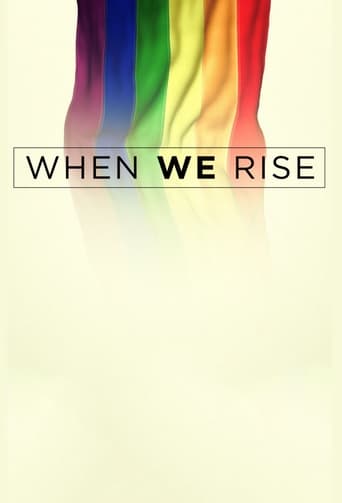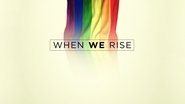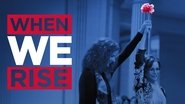tm-sheehan
A must see Teleplay for everyone who has ever cared about Human Rights issues ,especially young GLBTQI people who are enjoying many of the freedoms that were hard fought for and our struggles and setbacks from the early 1970's .A splendid cast that includes Guy Pearce ,Rachel Griffiths, Mary Louise Parker and Jonathan Majors it's all true ,it happened in my lifetime and it shows how far we still have to go,especially in Australia with the battle for Marriage Equality for all.
Sean H-. (cornflakeboy20)
This mini-history of lgbt civil rights begins in 1971 with a young Cleve Jones along with two other activists' story in San Francisco, as they attempt to create a safe space for the gay community, elect Harvey Milk, deal with the AIDS crisis, and finally help to usher in gay marriage. The beginning is quite compelling as we are thrust into the epicenter of late 60s/early 70s activism not only with the gay rights movement, but civil rights and feminism. While it is odd that it did not begin with the Stonewall riots a few years earlier, we do get the impression that we are following the right people at the right time to get a bird's eye view of the struggle. The actor playing the young Cleve Jones, upon whose memoir the story was based, does a wonderful job playing a charismatic young man. His older version, played by Guy Pearce, is equally convincing, though the passage of time and changes in his life have made him a less intriguing character. The young actress portraying Roma Guy, a community activist and feminist, suffers from unfortunate hair styling and a bit of shyness, which is corrected in her older version well-played by Mary Louise Parker. Ken Jones, no relation to Cleve, is first portrayed as a soldier, then we follow him as he loses a partner, contracts HIV, succumbs to drugs, then finds God and himself (and some bad hair choices). Dustin Lance Black, who created the series, is best known for the film Milk, and fortunately/unfortunately, the best elements of the story of When We Rise were also contained in that film. The history of San Francisco through the assassination of Milk is fascinating in and of itself. Then, we go in descending order. The history of the early days of AIDS told in the second two episodes is nearly as compelling (as presented here) but begins a slow descent in quality (needless to say, And the Band Played On, presents it better). By the time we're arguing for gay marriage, we wonder if perhaps focusing on different characters for each segment might have been a better plan. While the three leads are center to the action early on, they drift out of importance. The story begins following dramatic story lines that can seem melodramatic. As soon as a good thing happens to a character, you can be certain that something is coming to take the good thing way by the next scene, if not later in the scene itself. It gets a telenovela quality where anything that happens in the life of the characters is mere grist for drama. I am the sort of viewer who loves stories of protests and human rights struggles, and was nearly crying during the first four parts (or first two in their 90 minute versions). It is a great human story and tragedy, very compelling and very modern. It teaches you things you may not know, even if you consider yourself well informed. The last two episodes, perhaps because they are so recent, just are not as compelling. It seems very few compromises were made to put this show on ABC. I was greatly impressed that it didn't seem heavily censored for heterosexuals who might not even watch it. One of the concessions did seem to be that though Democrats have been better on gay rights issues, the series couldn't take sides. Much is made of Clinton not saying a certain phrase in a speech that the activists wanted him to make. This is a real letdown from the high stakes of earlier struggles, and makes you wonder if that scene was just in there to show that Clinton wasn't perfect on the issue (we all know he was not). Overall, I do wish that perhaps we had a new narrator or narrators for each of the two part portions of the series. And that it had started earlier, in the late 60s perhaps. But as a portrait of this particular civil rights struggle from the 70s until roughly today, this manages to well surpass expectations. It's entertaining, educational, and inspirational.
PippinInOz
This is superb. I have just finished watching the entire series andfeel very emotional and moved by the entire experience. I am a straight woman. So if you are reading about this series and are not a member of the LGBT community, please watch it. The acting is first class throughout, what you may know already as little 'soundbites' from the news and documentaries are given their personal and human context. I was cheering them on all through their struggles the injustices and the protests. I loved these characters and think you might too.This is an important piece of television for many reasons. Firstly, these are ordinary people doing courageous extraordinary things. There is a lesson there for all of us who care about human rights and equality, regardless of our gender or sexual persuasion. Secondly, in days like these, it reminds all of us just how much of a battle the LGBT community has had to fight (and continues to fight - particularly in certain parts of the World) for respect and equality. A better World does not come from doing nothing. Whether you feel strongly about workers' rights, (which I do), the environment.....you will feel in awe of what these people both had to suffer - and what they have achieved. Respect! Highly recommended.
dglink
Lofty goals and high ambitions are not guarantors of success. Neither are Oscar-winning screen writers, Oscar-nominated directors, nor seasoned performers. The overly ambitious TV miniseries, "We Shall Rise," comes across as an historical pastiche culled from such superior material as "Milk," "And the Band Played On," "Longtime Companion," and "The Normal Heart." Dustin Lance Black's California-centric teleplay uses broad strokes to cover the gay rights movement from the Stonewall riots to AIDS to marriage equality through the eyes of three players in the struggle: Cleve Jones, Roma Guy, and Ken Jones. However, even a five-part series cannot do justice to more then four decades of history, especially when the ABC telecast interrupts every two to five minutes with commercials; even more annoying, the commercials look like the program and the program looks like the commercials. Without any transitions, viewers need a few seconds to determine if they are still watching the program or if another ad has sneaked in. The four directors, which include Gus Van Sant, maintain a good pace and utilize newsreel footage, some with unconvincing inserts of the actors, interspersed with the drama to illustrate events. Although challenging to judge with all the interruptions, more favorable reviews may emerge after "We Shall Rise" appears on DVD.Perhaps most disrupting was the decision to change the cast members mid-program. Austin P. McKenzie, Emily Skeggs, and Jonathan Majors play Cleve, Roma, and Ken during the first few episodes. Then, Guy Pearce, Mary Louise-Parker, and Michael Kenneth Williams take over in the same roles as slightly older versions of the characters. The change is jarring; the younger actors bear little to no resemblance to their slightly more mature counterparts, and none attempts to match their characters mannerisms or personalities. The younger actors come off better, perhaps because they create the characters and suffer no comparisons to earlier incarnations as do Pearce, Parker, and Williams. However, the directors and cast should have studied "Moonlight," a film that seamlessly used three different actors to portray the same character at various stages of his life. Frankly, "We Shall Rise" had little reason to use different actors; the age disparity is not that great, and subtle make-up and acting could have convincingly bridged the age gap. Viewers now ponder why Cleve became more affected as he aged, while Ken became less good natured, not to mention the drastic physical changes.Unfortunately, ABC's brave decision to devote a week's prime-time programming to a lesson in gay rights history was not well served, and the weak ratings will likely dampen enthusiasm for further efforts. The disjointed telecast impacts the drama, and some good performances from a large talented cast suffer. A generous sprinkling of cameos from Whoopi Goldberg, Rosie O'Donnell, Dylan Walsh, David Hyde Pierce, Rob Reiner, and others testifies to the broad support and enthusiasm for the project. However, the intended audience for the project is uncertain. The LGBT community, their friends, and their families already know and have lived this history, while those opposed to equal rights will not tune in. With the choir stalls filled, are there any open minds to fill the pews?






